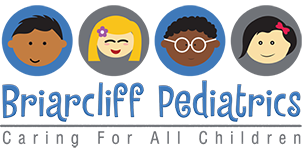Well Visit Checklist for Grade School-Aged Children
- On Oct, 31, 2024
- Doctor Notes
- Well Child
 So, your child is entering grade school! What an exciting time. You are, no doubt, equal parts nervous and excited about this new stage. How could you not be? After all, this new stage brings exciting changes and new milestones. We receive a lot of questions from parents about what to expect during the grade school stage, so below, we have prepared a list of some of the most frequent questions we are asked, so you can prepare your own check list. As you prepare for your child’s well visits throughout this stage, use these questions as a resource, and don’t be afraid to discuss these topics more thoroughly with your pediatrician.
So, your child is entering grade school! What an exciting time. You are, no doubt, equal parts nervous and excited about this new stage. How could you not be? After all, this new stage brings exciting changes and new milestones. We receive a lot of questions from parents about what to expect during the grade school stage, so below, we have prepared a list of some of the most frequent questions we are asked, so you can prepare your own check list. As you prepare for your child’s well visits throughout this stage, use these questions as a resource, and don’t be afraid to discuss these topics more thoroughly with your pediatrician.
Is my child’s height and weight within the expected range for their age?
From 3 until your child begins puberty, they should grow about 2 inches per year. Puberty will start between 8-13 for girls and 9-14 for boys. As your child enters puberty, they will grow faster – about 3 inches per year. Here’s how it can look:
- Boys: Expect to see your son grow between 13-14 inches and gain about 40 lbs. during puberty.
- Girls: Expect to see your daughter grow around 10 inches and gain about 25 lbs. during puberty.
Each child will develop at their own rate, and it is normal for some children to develop faster or slower than others. However, if your child seems to be significantly underdeveloped compared to other children their age, it may be time to speak with your pediatrician.
What vaccinations should my child receive during grade school years?
There are several vaccinations your child will receive during their grade school years. Adhering to a proper vaccination schedule will ensure that your child will receive the full benefit of each vaccine when it is administered. The vaccines recommended for:
- Ages 4- 6: Diphtheria, Tetanus, and Acellular Pertussis (DTaP), Inactivated Poliovirus (IPV), Measles, Mumps, Rubella (MMR), Varicella (VAR), COVID-19, Influenza.
- Ages 7-10: COVID-19, Influenza.
- Ages 11-12: COVID-19, Influenza, Tetanus, Diptheria, and Acellular Pertussis (Tdap), Human Papillomavirus (HPV), Meningococcal.
Experts routinely update the recommended vaccination schedule based upon the latest science available, so you can be sure that the vaccines recommended for each age group are necessary and effective to protect your child from serious diseases.
How much sleep does my child need, and is it normal for them to have trouble sleeping?
Getting the right amount of sleep is crucial for your child’s development. Poor sleeping habits and a lack of sleep can lead to a variety of health issues, such as obesity, diabetes, behavioral and attention disorders, as well as poor mental health. Throughout the different stages of your child’s development, the amount of sleep they require to support a healthy lifestyle will change. Children between the ages of 6-12 should be getting about 9-12 hours of sleep per night.
During this stage of development, you may notice your child struggling to sleep through the night. There can be several issues that can cause sleep problems, such as fear of the dark, devices in bedrooms, anxiety, or nightmares. If your child is struggling with their sleep, there are a few things you can do to encourage good sleeping habits.
- Be active: ensure your kids are very active throughout the day so that they can properly expel their energy. Plan activities that include mental and physical stimulation to keep your child engaged, keep them learning, and help them expel energy.
- Limit access to electronics: Studies have shown that electronic devices, including TV’s, phones, and laptops disrupt sleep. Create a family media use plan that ends screen time at least 1 hour prior to bedtime.
- Create a safe sleeping environment: Dimming your child’s bedroom lights and keeping the room temperature comfortable can create a tranquil environment where your child feels at ease. If they are struggling with anxiety or nightmares, allow your child to sleep with a favorite stuffed animal or a security blanket to help ease their fears. Some also find that relaxing music or meditation helps.
At what age should I start taking my child to the dentist?
Many people believe that oral health begins when your child’s first tooth appears. However, oral hygiene truly begins at birth. Dental visits, however, begin when your child reaches their second birthday. Between the ages of 6-12, dental visits are essential for gum health and the prevention of tooth decay. During these visits, you can expect your grade schooler’s dentist to take x-rays, perform a thorough cleaning, and apply a fluoride varnish to your child’s teeth. Fluoride is an important barrier that slows or stops cavities from developing and protects our teeth from acid damage.
What milestone should my child reach each year?
Ensuring your child reaches milestones through every stage of development is important to any parent. We want the best for our children and to ensure that they are on track for their continued growth and learning. There are many significant milestones that your child will reach during the grade school stage, and these milestones come quickly. Some of the most common milestones you will notice are:
- 6-8 years old: You will notice your child becoming more independent, seeking to dress and feed themselves. They will also begin to understand right and wrong, so it is important to praise good behavior and discipline bad behavior. You will also notice your child begin to engage in group activities and to seek acceptance from their peers. Spend some time talking with your child as they begin to navigate new feelings and emotions.
- 8-10 years old: Your child will begin to have a deeper understanding of right and wrong. They will recognize that their actions will have consequences, and their moral character will begin to develop. During this time, their bodies will also experience growth and changes as they enter the beginning stages of puberty. It is important to talk with your child about these changes and the feelings and emotions they will begin experiencing as a result.
- 10-12 years old: By the end of the grade school stage, you will notice your child acting more independently. Their friendships are stronger, and they develop closer bonds with their peers. They may also be experiencing more peer pressure from their friend group, so it is important to talk honestly with your child about what they are experiencing and discussing with their friends. As they have now entered puberty, they may be experiencing physical and emotional changes. Encourage and talk with them about these normal changes in a safe and comfortable environment.
Grade school years are an adventurous time, but also a time of immense change. Developing your child’s independence, sense of right and wrong, and relationships outside of your home may be exciting, but they may also experience fear and uncertainty. It is important to be an encouragement to your child, as your leadership during this time will be necessary for their future development. As pediatricians, we understand that these changes can sometimes be overwhelming, but we are here to support you and your family. To schedule your well visit with Dr. Raymond Deeb, Dr. Rebecca McCoy, Dr. Nicholas Kelly, or if you have any questions about what to expect during your upcoming visit, please contact Briarcliff Pediatrics. Remember to follow us on Facebook and Instagram for regular updates and health tips.




